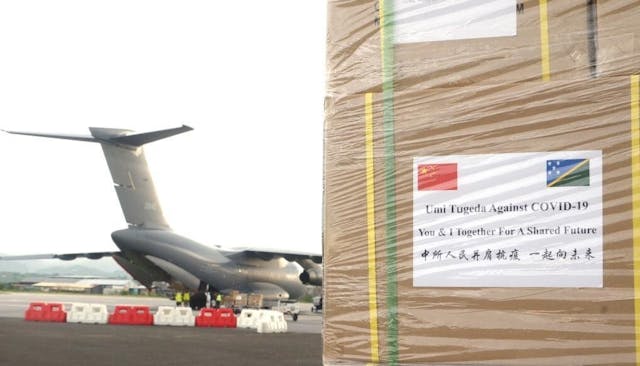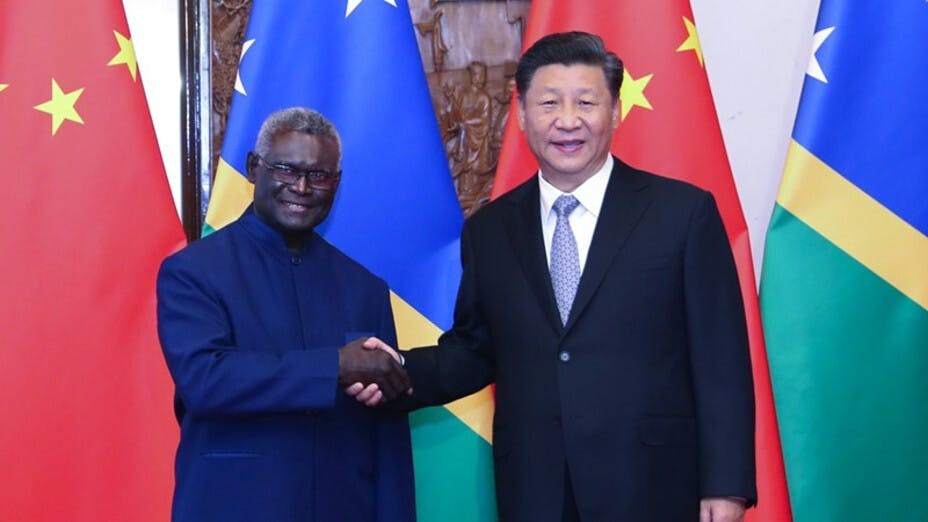包括美國、澳洲和紐西蘭在內的西方國家,對中國與所羅門群島最近簽訂的安全合作框架協議所表達的直接而深切的關切,不僅充分揭示了它們對地緣政治的反應,而且也充分顯示了它們忽略所羅門群島在2021年底騷亂後,為何與中國達成新安全合作協議的種種動態。
示威演變成騷亂 唐人街首當其衝
根據早前外洩的合作框架協議文件,指在所羅門群島同意下,可根據需要要求中國派遣警察、武警和軍方人員等執法力量到該國,協助維護社會秩序、保護人民生命財產安全、提供人道主義援助和應對自然災害。此外,中國船艦可以到該些島嶼進行後勤補給;中國軍隊也可能在島上保護中國人員和主要項目的安全。
毫無疑問,澳洲、紐西蘭和美國等西方國家反應強烈,將此類安全合作協議視為對其國家安全和政治利益的威脅。
然而,客觀地看,2021年11月24日至12月初在所羅門群島首都霍尼亞拉發生的騷亂中,數百名華人和華僑無家可歸,該市唐人街有4人喪生。中國駐所羅門群島大使館唯有協助霍尼亞拉的華人和華僑,據報道,一個名為馬萊塔民主(Malaita for Democracy)的親台灣組織發起了一場和平示威,不僅抗議所羅門群島政府在2019年與台灣斷交,轉向與中華人民共和國建交,還指摘當地政府貪腐和失業嚴重。
親美親台政客 與親北京政府角力
示威後來演變成暴力衝突,導致搶掠和建築物被焚。當地警方動用催淚氣體和橡膠子彈平亂,造成所羅門群島損失6700萬美元。騷亂的複雜性在於,馬萊塔省是所羅門群島人口最多的省份,由傾向支持美國和台灣的丹尼爾‧蘇達尼(Daniel Suidani)任省長,令所羅門群島的內政與北京─華盛頓─台北之間的三角政治關係交織在一起。
儘管台灣否認參與了從馬萊塔省開始的騷亂,但作為對所羅門群島「疫情外交」的一部分,台灣向馬萊塔省贈送了口罩和大米等物資。2021年12月6日,所羅門群島總理馬納西‧索加瓦雷 (Manasseh Sogavare) 的親北京政府在所羅門議會的不信任投票中,以32票對15票倖存下來,一些不滿索加瓦雷政府的批評者指摘部分支持他的國會議員收受中國的發展基金,但這種指摘缺乏實質證據,因此遭到政府否認和反駁。所羅門群島的內政陷入了親美親台的地方派與親中派的政治角力。

澳洲視島國為「後花園」 拒華進入「勢力範圍」
西方觀察家將中所的新安全協議視為對澳洲、紐西蘭和美國的「威脅」,他們忽視了霍尼亞拉唐人街的華人華僑怎樣成為了騷亂的政治受害者。他們也沒有明白在所羅門群島建立警察部隊的重要性。所羅門群島皇家警察隊仍然力量薄弱,必要時不得不依靠澳洲警察部隊來維持法律和秩序。如果說中國與所羅門群島的安全協議旨在增強島國警方的能力,那麼許多澳洲觀察家和政界人士將中所安全協議視為所謂的「威脅」,是自然和可以理解的。傳統上,澳洲把所羅門群島視為其「後花園」或地緣政治的勢力範圍。
然而,所羅門群島作為一個主權國家,如果她決心將其對澳洲警方的依賴去殖民化,並在中國警方支援下,將這種依賴轉變為更加自主的方式,那麼,將對警務的依賴從一個「白人」國家轉向另一個亞洲大國,自然引起了西方國家對這樣一份安全協議的過度反應。如果說中國的崛起已經被世界上許多國家視為「威脅」,那麼西方對中所安全協議的過度反應,也就不難理解了。
西方對所羅門群島的殖民統治思想如此根深柢固,被視為理所當然,以至中國與所羅門群島的安全協議的影響有如衝擊波。
此外,儘管華人和華僑僅佔所羅門群島總人口72萬的0.1%(約700人),但他們是勤奮、能幹的貿易商和生意人,為群島上的酒店業、飲食業、到會服務業、博彩業和航運業作出了巨大貢獻。他們在所羅門群島的社會地位很高,與當地人有良好的關係。因此,任何影響他們人身安全和利益的騷亂,都必然引起中國政府的關注,中國政府有義務保護其公民。如果說海外華僑是中國統戰工作的天然目標,那麼居住在霍尼亞拉唐人街的居民,對於中華人民共和國對所羅門群島的外交政策,具有重要的政治意義。
國家主權豈容無視 殖民主義一葉障目
批評中國和所羅門群島安全條約的西方人都沒有意識到,所羅門群島本身擁有主權,能夠自主決定是否加強與中國的警務和安全關係,而中國亦有義務保護群島上中國公民的安全。有趣的是,西方許多對中所安全協議的評論,一直只是大談所謂「中國威脅」,卻沒有客觀承認所羅門群島歷來被許多西方國家視為「殖民地」。儘管可悲,但也可以理解的是,在大多數西方評論家對中所安全協議的抨擊中,可以看到深刻的西方殖民主義意識。
當然,近幾個月來,中國在南海美濟礁、渚碧礁和永暑礁的軍事部署和設施,已經引起了美國及其盟國以至菲律賓的關注。南沙群島的主權爭端,已成為導致西方對中國與所羅門群島安全協議反應強烈的一個促發因素。

與華簽協議爭自主 處處強調平等協商
從分析的角度看,所羅門群島在太平洋仍然是一個弱國。當她試圖擺脫澳洲,重新獲得更多自治權時,與中國簽訂的安全協議是一項旨在提高島國警務能力的非殖民化倡議。但是,如果說澳洲是弱小的所羅門群島的傳統保護國,那麼中國進入所羅門群島的安全領域,自然會被一些澳洲人視為澳洲外交政策的失敗,因未能贏得所羅門群島政府領導層的心。
仔細閱讀互聯網上外洩的安全協議後發現,保密性和5年有效期是其中兩個主要條款。協議草案外洩現象表明,所羅門群島內部對該協議存在分歧。最重要的是,該協議有效期為5年。其內容不斷強調互相協商、平等和雙方同意。因此,大多數西方批評者都忽略了外洩協議內容中的相互平等和彼此同意的原則。
綜上所述,西方近期對中所安全協議的反應,不僅是西方對所羅門群島傳統的殖民主義和霸權主義的產物,也是對「中國威脅論」認知的結果。「中國威脅論」部分是由於中國在政治和軍事上迅速崛起所導致,部分則是對中國在南海軍事活動的強烈而持續的反應。然而,客觀上,西方批評中所安全協議的人,忽視了所羅門群島的主權權利,即將其薄弱的警務能力從以前對澳洲的依賴,轉變為在中國警方的培訓和協助下,加強當地警力。這些批評者也忽視了中國有義務保護其在所羅門群島的公民和華僑人身安全和利益的事實。
Politics of Western Responses to a Security Pact between China and Solomon Islands
The immediate and deep concerns expressed by Western countries, including United States, Australia and New Zealand, to a recently signed security pact between the People’s Republic of China (PRC) and the Solomon Islands fully reveal not only their geo-political reactions but also their neglect of the dynamics of why Solomon Islands reached the new security pact with China after the riot in late 2021.
According to a leaked framework agreement, Solomon Islands can request China to send police, armed police and military personnel and other law enforcement forces to the Islands to help maintain social order, protect the people’s lives and property, provide humanitarian assistance, and conduct disaster response in accordance with the needs and consent of the Islands. Moreover, China may make ship visits to the Islands, may obtain logistical replenishment and may stop over the Islands, while Chinese forces may also be used to protect the safety of Chinese personnel and main projects there.
Undoubtedly, Western countries like Australia, New Zealand and the United States have been reacting strongly, seeing such a security agreement as a threat to their national security and political interests.
However, from an objective standpoint, during the riot in Honiara that began from November 24 to early December 2021, hundreds of Chinese citizens became homeless and four people were killed in the city’s Chinatown. The Chinese embassy on the Solomon Islands had to help the Chinese residents in Honiara, where a peaceful protest launched by a reportedly pro-Taiwan group named Malaita for Democracy demonstrated against the government of the Solomon Islands for not only changing its diplomatic ties from Taiwan to the PRC in 2019, but also accusing the local government of alleged corruption and unemployment.
The protest turned violent, leading to looting and the fire set on buildings. The local police were used tear gas and rubber bullets to quell the domestic unrests, which cost the Solomon Islands U$67 million losses. The complexity of the local unrest in Malaita was that the province was the most populous and governed by Premier Daniel Suidani, who tended to support the United States and Taiwan. Domestic politics were intertwined with the triangular politics between Beijing-Washington-Taipei.
Although Taiwan denied any involvement in the domestic unrest in Malaita, it provided development aid such as masks and rice to the province as part of the island republic’s Covid-19 diplomatic maneuver over the Solomon Islands. The pro-China government of Prime Minister Manasseh Sogavare survived a no-confidence vote in the Solomon parliament on December 6, 2021 by having 32 votes supporting him against 15 that called for his downfall. Some critics of the Sogavare government accused some parliamentarians supportive of Sogavare of accepting China’s development fund, but such an accusation lacked concrete evidence and led to the government’s denial and rebuttal. The domestic politics of the Solomon Islands were enmeshed in the political rivalries between the pro-US/pro-Taiwan local faction and the pro-China faction.
Western observers who see China’s new security pact as a “threat” to Australia, New Zealand and the United States have ignored how the Chinese residents in the Chinatown of Honiara became the political victims of the unrest. Nor do they identify the importance of how to build up the police force on the Solomon Islands, where the Royal Solomon Islands Police remained weak and had to rely on the Australian police force to maintain law and order if necessary. If the security agreement between China and the Solomon Islands aims at building up the policing capacity of the Islands, it is understandable and natural that many Australian observers and politicians have been viewing the Sino-Solomon Islands security pact as a so-called “threat” to Australia, which has traditionally seen the Solomon Islands as its “backyard” or its sphere of geopolitical influence.
Yet, if the Solomon Islands is a sovereign state with its determination to decolonize its policing reliance on Australia and shift such dependence to a more autonomous manner with the Chinese policing assistance, the move away from the policing dependence on a “white” country to another Asian giant naturally triggered the Western overreaction to such a security pact. If the rise of China has been seen by many countries in the world as a “threat,” it is easy to understand the Western overactions to the Sino-Solomon Islands security pact. TheWestern colonial domination over Solomon Islands has been so deeply entrenched and taken for granted that the Chinese security pact with the Islands came as a shockwave.
Moreover, although the Chinese population only occupied 0.1 percent (about 700) of the total 720,000 population of the Solomon Islands, they are diligent and competent traders and businesspeople who have been contributing immensely to the hotel, restaurant, catering, gaming and shipping industries on the Islands. Their social status in Solomon Islands is high and they have good connections with the local peoples. As such, any riot that affected their personal safety and interests must arouse the concerns of the PRC government, which has its obligation to protect its citizens. If the overseas Chinese are the natural target of China’s united front work, the residents living in the Chinatown of Honiara were and are politically significant to the PRC foreign policy toward the Solomon Islands.
None of the Western critics of the security pact between China and the Solomon Islands has appreciated the fact that while the Solomon Islands has its own sovereignty and autonomy to decide how its policing and security relations with China can be enhanced, China itself has its obligations to protect the Chinese citizens on the Islands. Interestingly, many Western commentators on the security pact between China and the Solomon Islands have been harping on the same theme of the so-called “China threat” without objectively admitting that the Solomon Islands were traditionally regarded by many Western states as their “colony.” Sadly, but understandably, a profound sense of Western colonialism can be seen in most Western commentators’ criticisms of the Sino-Solomon Islands security agreement.
Of course, in recent months, the Chinese military build-up and installations on the Mischief Reef, Subi Reef and Fiery Cross on the South China Sea have raised the eyebrows of the United States and its allies as well as the Philippines. Territorial disputes over the Spratly Islands have become a precipitating factor contributing to the strong Western reaction to the security pact between China and the Solomon Islands.
From an analytical perspective, the Solomon Islands remains a weak state in the Pacific Ocean. When it has attempted to regain more autonomy away from Australia, the security pact with China is a decolonization initiative to enhance the policing capability of the Islands. However, if Australia was the traditional protectorate of the weak Solomon Islands, China’s entry into the security arena of the Solomon Islands is naturally viewed by some Australians as a failure of Australia’s foreign policy, which failed to win the hearts and minds of the political leadership on the Islands.
A careful reading of the leaked security agreement on the Internet has revealed that confidentiality and the validity of five years were two of the main stipulations. The phenomenon of having the draft agreement leaking out to the Internet showed that the Solomon Islands had internal opinion difference over the pact. Most importantly, the agreement is valid for five years. Its content constantly emphasizes mutual consultation, equality and consent from both sides. As such, most Western critics of the pact have ignored the principle of mutual equality and consent in the leaked agreement.
In conclusion, the recent Western responses to the Sino-Solomon Islands security pact are not only an outcome of the traditional Western colonialism and hegemony over the Solomon Islands, but also a result of the perception of the “China threat.” The “China threat” perception is partly the outcome of the rapid rise of China, politically and militarily, and partly a strong and continuous reaction to the Chinese military activities in the South China Sea. Yet, objectively speaking, Western critics of the Sino-Solomon Islands security pact have ignored the sovereign right of the Solomon Islands to shift its weak policing capacity away from a previous dependence on Australia to arobust local police force with the policing training and assistance from China. These critics have also ignored the fact that China has its obligations to protect the personal safety and interests of its citizens and overseas Chinese on the Solomon Islands.
原刊於澳門新聞通訊社(MNA)網站,本社獲作者授權轉載。


































